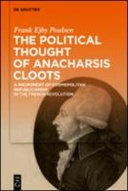Explore

The Political Thought of Anacharsis Cloots
Frank Ejby Poulsen
2023
0 Ungluers have
Faved this Work
Login to Fave
Historians have often either ignored Anacharsis Cloots (1755–1794) or considered him deranged because he claimed to be the ‘orator of the human race’ and devised a ‘universal republic’ based on the ‘sovereignty of the human race’. This book is the first comprehensive study of the entire body of Cloots’s written works and political actions. By contextualizing them, the book non only rehabilitates Cloots as a political thinker worthy of consideration, but also argues that his political thought constitutes a specific branch of republicanism in the age of Atlantic revolutions: cosmopolitan republicanism. The introduction suggests how 18th-century French cosmopolitanism was a new philosophical tradition, but was composed of several themes, which the book then analyses in Cloots’s writings. The first chapter provides a brief overview of his life. The second chapter explains why he called himself orator and wrote pamphlets, and why contemporary readers should not discard this as non-philosophical. Having established Cloots’s writings as constituting a philosophical system, the following chapters explores it through the themes laid out in the introduction. First, the concept of reason and his understanding of science. Second, the paradigm of natural law and the role of nature in moral and political thought. Third, the conception of humanity and individuals in nature and society. Finally, republicanism and its principles. The last chapter summarizes the elements of Cloots’s cosmopolitan republicanism and opens a research programme to other political thinkers in the age of Atlantic revolutions for historians and political theorists. ; Historians have often either ignored Anacharsis Cloots (1755–1794) or considered him deranged because he claimed to be the ‘orator of the human race’ and devised a ‘universal republic’ based on the ‘sovereignty of the human race’. This book is the first comprehensive study of the entire body of Cloots’s written works and political actions. By contextualizing them, the book non only rehabilitates Cloots as a political thinker worthy of consideration, but also argues that his political thought constitutes a specific branch of republicanism in the age of Atlantic revolutions: cosmopolitan republicanism. The introduction suggests how 18th-century French cosmopolitanism was a new philosophical tradition, but was composed of several themes, which the book then analyses in Cloots’s writings. The first chapter provides a brief overview of his life. The second chapter explains why he called himself orator and wrote pamphlets, and why contemporary readers should not discard this as non-philosophical. Having established Cloots’s writings as constituting a philosophical system, the following chapters explores it through the themes laid out in the introduction. First, the concept of reason and his understanding of science. Second, the paradigm of natural law and the role of nature in moral and political thought. Third, the conception of humanity and individuals in nature and society. Finally, republicanism and its principles. The last chapter summarizes the elements of Cloots’s cosmopolitan republicanism and opens a research programme to other political thinkers in the age of Atlantic revolutions for historians and political theorists.
This book is included in DOAB.
Why read this book? Have your say.
You must be logged in to comment.
Rights Information
Are you the author or publisher of this work? If so, you can claim it as yours by registering as an Unglue.it rights holder.Downloads
This work has been downloaded 60 times via unglue.it ebook links.
- 60 - pdf (CC BY-NC-ND) at Unglue.it.
Keywords
- 20th century history: c 1900 to c 2000
- Aufklärung
- Cosmopolitanism
- Enlightenment
- European History
- Französische Revolution
- French Revolution
- Historiography
- History
- History: earliest times to present day
- History: specific events & topics
- History: theory & methods
- Humanities
- Kosmopolitismus
- Liberalism & centre democratic ideologies
- Modern history to 20th century: c 1700 to c 1900
- Nationalism
- Philosophy
- Political Ideologies
- Political Science & Theory
- Politics & government
- Regional & national history
- Republicanism
- Republikanismus
- Social & cultural history
- Social & political philosophy
- Society & Social Sciences
- thema EDItEUR::3 Time period qualifiers::3M c 1500 onwards to present day
- thema EDItEUR::3 Time period qualifiers::3M c 1500 onwards to present day::3MP 20th century, c 1900 to c 1999
- thema EDItEUR::J Society and Social Sciences::JP Politics and government::JPA Political science and theory
- thema EDItEUR::J Society and Social Sciences::JP Politics and government::JPF Political ideologies and movements
- thema EDItEUR::J Society and Social Sciences::JP Politics and government::JPF Political ideologies and movements::JPFK Centrist democratic ideologies
- thema EDItEUR::J Society and Social Sciences::JP Politics and government::JPF Political ideologies and movements::JPFN Nationalism
- thema EDItEUR::N History and Archaeology
- thema EDItEUR::N History and Archaeology::NH History
- thema EDItEUR::N History and Archaeology::NH History::NHA History: theory and methods::NHAH Historiography
- thema EDItEUR::N History and Archaeology::NH History::NHB General and world history
- thema EDItEUR::N History and Archaeology::NH History::NHD European history
- thema EDItEUR::N History and Archaeology::NH History::NHT History: specific events and topics::NHTB Social and cultural history
- thema EDItEUR::Q Philosophy and Religion::QD Philosophy::QDT Topics in philosophy::QDTS Social and political philosophy
Links
DOI: 10.1515/9783110782547Editions

